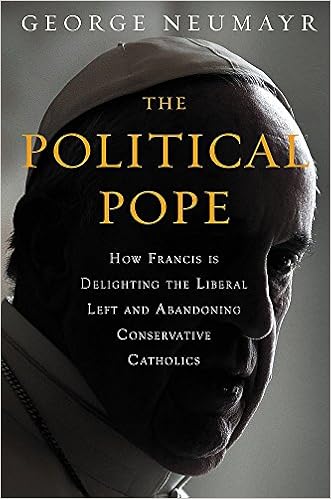Luther's harsh critique against the papacy were largely based upon his estimation that the papacy was a churchly office. Either because of his disappointment in the churchly character of that office or because he did, in fact, perceive the political dimensions of the papacy, Luther was brutal. But then again, the Popes that Luther dealt with were brutal against him. If only to read the papal bull of excommunication, it is clear that the questions and challenges of Luther (and other reformers over the centuries) were treated as a personal and political threat to the Pope and the doctrinal issues were not quite front and center. It was as if Rome was offended that any questions were asks or any challenges were given to things (things, it would turn out, that the inner circle already was having second thoughts about).
Lutherans still are not sure what to make of the papacy. It is political and we would rather have it be a churchly and theological office so that we could address the churchly and theological concerns left unresolved even after 500 years. But at the same time, it fits into the Lutheran critique of the office that it is political moreso than churchly or theological. All the vestments in the world cannot cover the political dimensions of the decisions made by popes, the appointment of bishops, and the very papacy itself (and how they got the office). Our concerns once made and still confessed have to do with the failures, however, of the churchly and theological character of the office. Its political nature we could gladly accept or reject but it is the churchly definition and the theological truths at stake that force us to continue to monitor and review the papacy. No Lutheran worth his salt can afford to ignore the papacy -- especially in a world in which there are so many more Roman Catholics than there are Lutherans and there are such deep divisions among the Lutherans!
John Paul II and Benedict XVI were examples of popes who tried very hard to make the politics of the office secondary to the theological responsibilities entrusted it by Rome. But for every theological giant, there have been many theological dwarfs whose contributions to the office and to Roman Catholicism have been largely detrimental to both. Francis certainly falls into the latter camp. His tenure has been marked by a lack of ideology, contradiction, false starts, backtracking, and deal making that would well befit a legislator working for advancement. Under the guise of holiness, there is a political office which some exploit and others work to contain. Certainly the choosing of a pope has long and more often than not been political. I would not be surprised if the next pope were chosen with an eye to diversity just as popes of a previous era were a contest between Italian regional and personal goals.
The problem for me as a Lutheran is that this largely political office has been endowed with theological authority, especially under Francis, that makes the office even more political even while cloaking the edicts with the faith. For all the years spent to endow the office with mystery and a persona larger than life, its current occupant sees to take great delight in stripping away the veneers or religiosity from it. Consider the reasons Francis used when he recently restricted the Latin Mass. Was this not a raw political act undertaken under the premise of theological necessity? Perhaps it would be easier on my Lutheran sensibilities if popes stuck to tradition, to the naming of bishops and the promulgation and preservation of the faith instead of using a theological framework to advance a political ambition. By the way, I am not at all suggesting that other churches, including my own, do not have a political problem. We do. But Rome is unique in having a papacy which endows all the political authority into one universal office and gives that same pope the ability to promote cardinals and structure things so that he can control his legacy. For every John XXIII who surprised them, there are dozens of popes who turned out to be rather predictable to those who elected them.
Perhaps the best Lutheran approach is to focus on the political nature of the papal office and direct the theological criticism to the broader structures of the Roman Catholic Church. For the reality is that a pope is often elected more for who he is not than who he is. And that is, after all, the way of politics.

2 comments:
We should not fail to see that the POTUS evidently sees himself somewhat of a pope, as well. “Faithful” Catholic, he (or at least those who advise him) is actively making decisions, mandates, and executive actions that have large theological consequences.
I have never taken issue with the ecclesiastical structure of the Roman Catholic Church or its heirarchical nature. As someone who spent much of his life in the military, it makes sense to have a single head of the ecclesiastical body. The issue is, and has been since before the Reformation that the Office of the Papacy was vested with infallible authority, which effectively places itself above the power of the scriptures to teach, reprove, and rebuke both the man who fills the office, and the office itself. No unity can occur with Rome by any ecclesiastical body be they Eastern Orthodox, Lutheran, or otherwise, until Rome repents of and recants of this doctrine. Alas, Rome has essentially staked their authority on the infallibility of the office rather than the infallibility of God's Word, and as such, there is no mechanism inherent in Roman Catholic theology to correct this abuse of doctrine.
Post a Comment